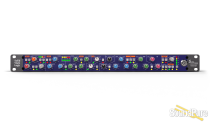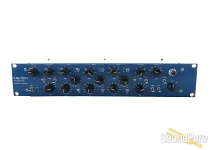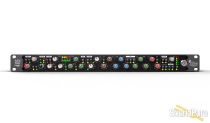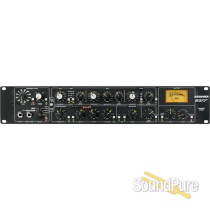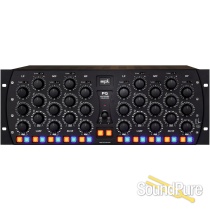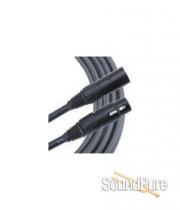-
Call Us Toll Free888-528-9703
-
Local/International (+1)919-682-5552
- Call Us! Toll Free! 888-528-9703
- Local / International (+1) 919-682-5552

GML 8200 2-Channel Parametric EQ w/ PSU From Sound Pure
The GML 8200 Parametric Equalizer is the reference standard parametric equalizer, from the engineer who invented the concept. Its revolutionary circuitry was first envisioned by George Massenburg and is now embodied in this progressive design.
"Gone, Baby, Gone"
This one is sold. Don't miss the next one. Some things never even make it to the site so stay up to date on our used collection.
We get in many oddities, rare and vintage products, most of which go fast. If you're on the hunt for something specific, something unique, or something priced right, let us notify you on our used collection before the items even hit the site.
Want to know if one lands?
Notify MeWant to discuss what's coming?
Manufacturer's Description from Sound Pure
The GML Model 8200 Parametric Equalizer has become the reference standard due in
large part to its features:
• All-discrete, Class-A design; no integrated circuits to compromise the audio path
• No interstage or coupling capacitors to add distortion or degrade over time
• Transformerless; precision electronically balanced input buffer and DCservo stabilized direct-coupled output
• Carbon-film precision potentiometers, manufactured to GML exacting standards
• Designed with GML 9202 low-noise, low-distortion, wide dynamic range, wide bandwidth precision discrete opamp
• No tantalum, ceramic, or electrolytic capacitors in the signal path
• Precious-metal interconnects
• High-quality XLR interconnects, Au over Ag
• Illuminated push-button switches for "EQ In" and "EQ Out"
• LED power indicator
• Multi-colored knobs, GML standard
• Rugged and stylish black-anodized aluminum chassis
• Reverse-anodized lettering, much more permanent than ink or paint processes
• Quality PCB manufacturing, assembly, and chassis construction
The GML Model 8200 Series II Parametric Equalizer offers astonishing precision and sonic accuracy when sculpting the response of any source. Its operational characteristics have been honed through many years of use in the most critical recording and mixing situations and have proven both reliable and amazingly accommodating.
The basis of the parametric design topology, in general, specifies control over not only gain or attenuation, but also over both frequency and “Q” factor in multiple user-defined bands. In the case of parametric equalization, “Q” is defined as the center frequency of the alteration (whether gain or attenuation) divided by the bandwidth of that alteration. It follows, then, that low values of “Q” affect a wide range of frequencies around the cut or boost, while high values of “Q” specify a narrow slope around the center frequency. Another important aspect of true parametric equalization, as embodied in the Model 8200, is the existence of overlapping frequency bands, which provide great precision and flexibility. Specifically, the 8200 provides complete control over a wide frequency range and “Q” setting, along with 15 dB of cut or boost on five individual bands, with the front panel controls for frequency and “Q” mounted concentrically. The addition of the “Q” characteristic represents the foremost advance in equalizer technology since the invention of the transistor as a replacement for bulky and noisy vacuum tubes, and empowers the user to maintain precise and musical control over the tonal attributes of the spectrally processed signal. (Graphical representation of the Q characteristic and gain steps may be found in Appendix A of this manual.). The availability of up to 15 dB of gain or attenuation is significant in the audio world, since most contemporary equalizers offer at most 12 dB of cut or boost, and usually not over such flexible overlapping multiple bands. Thus, it is possible to achieve any particular “sound” that is desired, no matter if the goal is a subtle alteration or an audible coloration effect.
Front panel controls on the Model 8200 Series II Parametric Equalizer include an illuminated in/out pushbutton switch for each channel, five color-coded bands per channel with amplitude and dual-concentric frequency and "Q" potentiometers, plus a power indication LED. The amplitude pots are continuously variable between +15 dB and -15 dB, with highly accurate 0 dB settings. Each band offers a wide array of frequencies to select on the outer knob of the dual-concentric potentiometer, with a good deal of overlap between bands to accommodate almost any combination of cuts and boosts. The Low and High bands offer counter-clockwise detents for shelving curves in addition to the variable "Q" values from 0.4 to 4 found in the other three bands--all on the central knobs of the dual-concentric potentiometers. Frequency markings can be found along the inner, larger ring of numbers, while the outer, smaller numbers encircling the dual-concentric potentiometer denotes "Q" value.

About Manufacturer
Sound Pure gift certificates, packing solutions, and swag!





